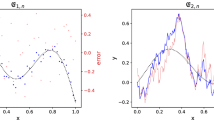Abstract
We consider the problem of estimating a smooth functional of an unknown signal with discontinuity from Gaussian observations. The signal is a known function depending on an unknown parameter. This problem is closely related to the famous change-point problem. We obtain an asymptotic likelihood ratio process for the noise level tending to 0. Bayesian and maximum likelihood estimates are constructed and their relative efficiency is studied. Some simulation results and conclusions on non-asymptotic behavior of these estimates are presented.
Similar content being viewed by others
References
P. K. Bhattacharya, “Some Aspects of Change-Point Analysis”, in IMS Lecture Notes, Vol. 23: Change-Point Problems (1994), pp. 28–55.
P. K. Bhattacharya, “Maximum Likelihood Estimation of a Change-Point in the Distribution of Independent Random Variables: General Multiparameter Case”, J. Multivar.Anal. 23, 183–208 (1987).
P. K. Bhattacharya and P. J. Brockwell, “The Minimum of an Additive Process with Applications to Signal Estimation and Storage Theory”, Z. Wahrsch. verw. Gebiete 37, 51–75 (1976).
B. E. Brodskii and B. S. Darkhovskii, “Asymptotic Analysis of Some Estimates in the a Posteriori ‘Disorder’ Problem”, Theory Probab. Appl. 35, 550–556 (1990).
B. E. Brodsky and B. S. Darkhovsky, Nonparametric Methods in Change-Point Problems (Kluwer Acad. Publ., the Netherlands, 1993).
H. Chernoff and S. Zacks “Estimating the Current Mean of a Normal Distribution which is Subject to Changes in Time”, Ann. Math. Statist. 35, 999–1028 (1964).
M. Csörgő and L. Horváth, Limit Theorems In Change-Point Analysis in Wiley Series in Probab. and Statist. (Wiley, 1997).
D. Ferger, Change-Point Estimators in Case of Small Disorders, J. Statist. Plann. Inf. 40 (1994), 33–49.
D. V. Hinkley, “Inference About the Change Point in a Sequence of Random Variables”, Biometrika 57, 1–17 (1970).
I. A. Ibragimov and R. Z. Hasminski, Statistical Estimation: Asymptotic Theory (Springer, New York, 1981).
A. F. S. Lee and S. M. Heghinian, “A Shift of the Mean Level in a Sequence of Independent Normal Random Variables-a Bayesian Approach”, Technometrics 19, 503–506 (1977).
H. Rubin, “The Estimation of Discontinuities in Multivariate Densities and Related Problems in Stochastic Processes”, in: Proc. Fourth Berkeley Symp. Math. Statist. Probab. (Univ. California Press, Berkeley, 1961), Vol. 1, 563–574.
H. Rubin and K.-S. Song, “Exact Computation of the Asymptotic Efficiency of Maximum Likelihood Estimators of a Discontinuous Signal in a Gaussian White Noise”, Ann. Statist. 23, 732–739 (1995).
A. Sen and M. S. Srivastava, “On Tests for Detecting Change inMean”, Ann. Statist. 3, 98–108 (1975).
A. N. Shiryaev, Optimal Stopping Rules (Springer, New York, 1978).
Author information
Authors and Affiliations
Corresponding author
About this article
Cite this article
Enikeeva, F. On two estimates related to the change-point problem. Math. Meth. Stat. 21, 29–42 (2012). https://doi.org/10.3103/S1066530712010024
Received:
Accepted:
Published:
Issue Date:
DOI: https://doi.org/10.3103/S1066530712010024



